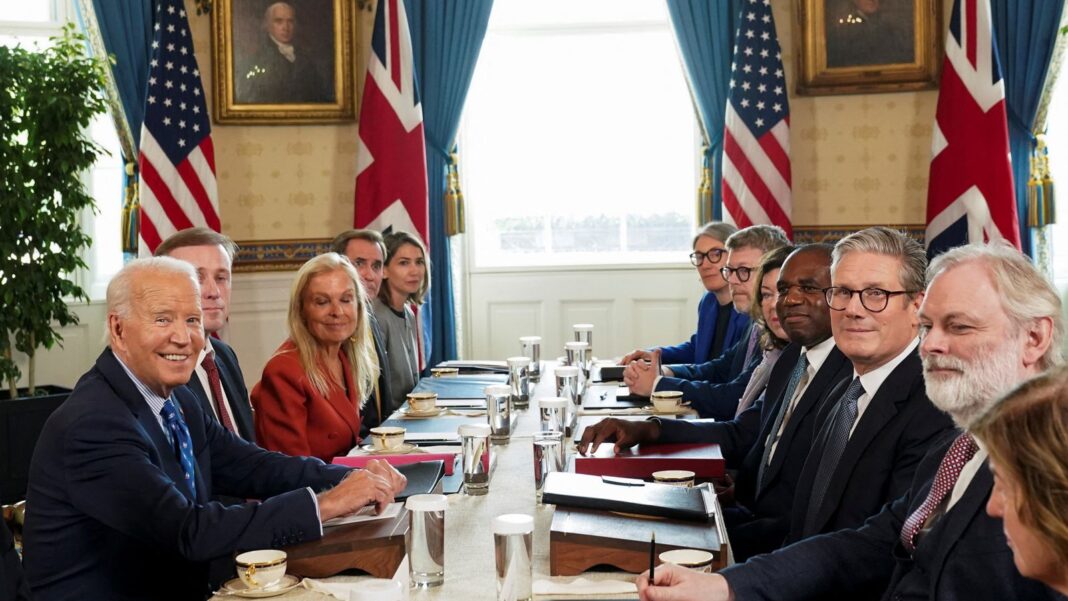Sir Keir Starmer has talked up the US-UK relationship after a White House meeting with Joe Biden, but questions remain over Ukraine’s use of long-range missiles.
The prime minister travelled to Washington this week to meet with President Biden to discuss the wars in Ukraine and Gaza – among other issues.
Speaking before the “long and productive” meeting held in the White House on Friday, Sir Keir said the two countries were “strategically aligned” in their attempts to resolve the war.
Afterwards, he skirted around questions regarding Ukraine’s use of long-range missiles, saying: “We’ve had a long and productive discussion on a number of problems, including Ukraine, as you’d expect, the Middle East, and the Indo-Pacific, talking strategically about tactical decisions.
“This isn’t about a particular decision but we’ll obviously pick up again in UNGA (UN General Assembly) in just a few days’ time with a wider group of individuals, but this was a really important invitation from the president to have this level of discussion about those critical issues.”
Ukraine war latest: Putin threatens NATO with ‘war’
Decisions loom for Ukraine’s key Western allies as Volodymyr Zelenskyy has recently increased pressure on them to permit his forces to use long-range missiles to strike inside Russian territory.
However, despite repeated calls for a decision, the West has so far resisted green-lighting the use of the missiles.
Sir Keir Starmer and David Lammy speaking to the media outside the White House on Friday. Pic: PA
Two US officials familiar with the discussions said they believed that Sir Keir was seeking US approval to let Ukraine use British Storm Shadow missiles for expanded strikes into Russia, according to Reuters news agency.
They added that they believed Mr Biden would be amenable.
The president’s approval would be needed because Storm Shadow components are made in the US.
But when speaking to journalists after the meeting, Sir Keir was repeatedly pressed on the long-range missile question but evaded giving a firm decision.
“This wasn’t a meeting about a particular capability. That wasn’t why we got our heads down today,” he said.
The US has been concerned that any step could lead to an escalation in the conflict and has moved cautiously so far, however, there have been reports in recent days that Mr Biden might shift his administration’s policy.
It wasn’t much, but it’s a start
There wasn’t much to say at the end, but it’s a start.
Both sides in these discussions had spent some time playing down expectations and the Americans were insistent their stance wasn’t changing on Ukraine and long-range missiles.
“Nothing to see here” seemed to be the message.
Only, there clearly was – a glance at the headlines gave that the lie.
It’s not every day a Russian president threatens war with the West.
The UK and US were discussing a change in strategy because they must – anything less would be a dereliction of duty for two leaders pledging a commitment to Ukraine’s fight.
Just ask Kyiv’s president Volodymyr Zelenskyy.
Following the meeting, Sir Keir Starmer said they’d talked tactics and strategy.
It will have had missiles, range, and Russian territory at the heart of it.
That is the material change in strategy demanded by Ukraine and supported widely among its backers.
A plan discussed by both sides of the special relationship will now be floated to other, allied nations in an effort to build a coordinated coalition behind a change in strategy.
And they’ll do it against the clock.
There is the unpredictability of the war itself in Ukraine and no less certainty surrounding the political battle at home.
A Trump victory in November’s US election would change the picture – here and there.
Vladimir Putin previously threatened the West, warning that allowing Ukraine to use long-range missiles to strike inside Russian territory would put Moscow “at war” with NATO.
Speaking to Russian state television, he insisted the decision would “significantly change” the nature of the war.

Pic: AP
He added: “This will be their direct participation, and this, of course, will significantly change the very essence, the very nature of the conflict.
“This will mean that NATO countries, US, European countries are at war with Russia.
“If this is so, then, bearing in mind the change in the very essence of this conflict, we will make appropriate decisions based on the threats that will be created for us.”

Keep up with all the latest news from the UK and around the world by following Sky News
When asked about the threats, Mr Biden brushed them aside, saying: “I don’t think much about Vladimir Putin.”
There remains some scepticism within the US over the impact that allowing Kyiv to unleash long-range missiles would have.
US officials, according to Reuters, have pointed out that Ukraine already has the capability to strike into Russia using drones, and while US missiles would enhance that they are too costly and limited in number to change the overall picture.







